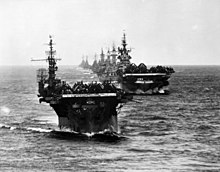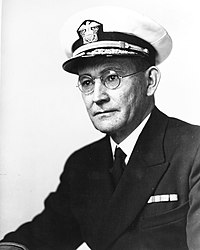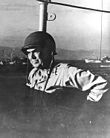Leyte Gulf order of battle
This article has multiple issues. Please help improve it or discuss these issues on the talk page. (Learn how and when to remove these messages)
|
The Battle of Leyte Gulf, generally considered to be the largest naval combat in history, was fought 24–25 October 1944 in the waters of the Philippine Islands by elements of the Imperial Japanese Navy's Combined Fleet (bringing together the IJN's 2nd Fleet, 3rd Fleet and 5th Fleet) and the United States Navy's Pacific Fleet (bringing together the USN's 3rd Fleet and 7th Fleet). Of the five separate engagements that made up the battle as a whole, the forces involved in the three principal ones are listed here.
Since the Japanese assumed the tactical initiative in all three actions, their forces are listed first in each section.
Losses in these three actions
IJN: 1 fleet carrier, 3 light carriers, 2 old battleships, 3 heavy cruisers, 3 light cruisers, 9 destroyers, 1 oiler
USN: 2 escort carriers, 2 destroyers, 1 destroyer escort
- The light aircraft carrier USS Princeton was heavily damaged and scuttled with great loss of life on 24 October while engaging in battle against land-based Japanese aircraft flying into the Leyte area east of Luzon. The loss of Princeton is always included in the casualties of the Battle of Leyte Gulf.
24–25 Oct – Battle of Surigao Strait
[edit](according to Tully, Anthony (2009). Battle of Surigao Strait. Bloomington, IN: Indiana University Press. ISBN 978-0-253-35242-2.)




Japanese Forces
[edit]Southern Force
Vice Admiral Shōji Nishimura (killed during battle) in battleship Yamashiro
- Force C (sortied from Brunei Bay 22 Oct)
- Vice Adm. Nishimura (KIA)
- Battleship Division 2 (Vice Adm. Nishimura – KIA)
- 2 Fusō-class old battleships (12 × 14-in. main battery)
- 1 Mogami-class heavy cruiser (6 × 8-in. main battery)
- Mogami (damaged by gunfire and air attacks, scuttled 25 Oct)
- Destroyer Division 4 (Capt. K. Takahashi)
- 3 Asashio-class destroyers (6 × 5-in. main battery)
- 1 Shiratsuyu-class destroyer (5 × 5-in. main battery)
- Battleship Division 2 (Vice Adm. Nishimura – KIA)
- Second Striking Force[a] (sortied from Pescadores, Formosa 22 Oct)
- Vice Admiral Kiyohide Shima in heavy cruiser Nachi
- Cruiser Division 21 (Vice Admiral Shima)
- 2 Myōkō-class heavy cruisers (10 × 8-in. main battery)
- Destroyer Squadron 1 (Rear Adm. Masatomi Kimura)
- 1 Nagara-class light cruiser (7 × 5.5-in. main battery)
- Abukuma (sunk by air attack 26 Oct)
- 4 destroyers
- 2 Fubuki-class (6 × 5-in. main battery)
- 1 Asashio-class (6 × 5-in. main battery)
- 1 Kagero-class (6 × 5-in. main battery)
- Shiranui (sunk by air attack 27 Oct)
- 1 Nagara-class light cruiser (7 × 5.5-in. main battery)
- Cruiser Division 21 (Vice Admiral Shima)
American Forces
[edit]

Seventh Fleet
Vice Admiral Thomas C. Kinkaid in amphibious command ship Wasatch
- Task Force 77 (Central Philippines Attack Force)
- Vice Admiral Kinkaid
- Task Group 77.2
- Rear Admiral Jesse B. Oldendorf in heavy cruiser Louisville
- Task Unit 77.2.2 (Left Flank)
- Rear Admiral Jesse B. Oldendorf
- 3 heavy cruisers
- 1 Northampton-class (9 × 8-in. main battery)
- Louisville (Capt. S.H. Hurt)
- 1 Portland-class (9 × 8-in. main battery)
- Portland (Capt. Thomas G. W. Settle)
- 1 New Orleans-class (9 × 8-in. main battery)
- Minneapolis (Capt. H.B. Slocum)
- 1 Northampton-class (9 × 8-in. main battery)
- 2 light cruisers
- Both Cleveland-class (12 × 6-in. main battery)
- Denver (Capt. Albert M. Bledsoe)
- Columbia (Capt. Maurice E. Curts)
- Both Cleveland-class (12 × 6-in. main battery)
- Destroyer Squadron 56 (Capt. Roland N. Smoot)
- 9 Fletcher-class destroyers (5 × 5-in. main battery)
- Newcomb, Richard P. Leary, Albert W. Grant (damaged by friendly and enemy gunfire), Robinson, Halford, Bryant, Heywood L. Edwards, Bennion, Leutze
- 9 Fletcher-class destroyers (5 × 5-in. main battery)
- 3 heavy cruisers
- Task Unit 77.2.1 (Battle Line)
- Rear Admiral George L. Weyler in battleship Mississippi
- 6 old battleships
- 2 Colorado-class (8 × 16-in. main battery)
- West Virginia (Capt. Herbert V. Wiley)
- Maryland (Capt. Herbert J. Ray)
- 2 Tennessee-class (12 × 14-in. main battery)
- Tennessee (Capt. J.B. Heffernan)
- California (Capt. H.P. Burnett)
- 1 New Mexico-class (12 × 14-in. main battery)
- Mississippi (Capt. H.J. Redfield)
- 1 Pennsylvania-class (12 × 14-in. main battery)
- Pennsylvania (Capt. C.F. Martin)
- 2 Colorado-class (8 × 16-in. main battery)
- 6 destroyers
- 4 Fletcher-class (5 × 5-in. main battery)
- 2 Gleaves-class (4 × 5-in. main battery)
- 6 old battleships
- Task Group 77.3 (Right Flank)
- Rear Admiral Russell S. Berkey in light cruiser Phoenix
- 1 heavy cruiser
- 1 County-class (8 × 8-in. main battery)
 Shropshire (Capt. C.A.G. Nichols, RN)
Shropshire (Capt. C.A.G. Nichols, RN)
- 1 County-class (8 × 8-in. main battery)
- 2 light cruisers
- Both Brooklyn-class (15 × 6-in. main battery)
- Destroyer Squadron 24 (Capt. Kenmore M. McManes)
- 5 Fletcher-class (5 × 5-in. main battery)
- 1 Tribal-class (8 × 4.7-in. main battery)
- 1 heavy cruiser
- Picket Patrol
- Destroyer Squadron 54 (Capt. Jesse G. Coward)
- Destroyer Division 107
- 2 Fletcher-class (5 × 5-in. main battery)
- Destroyer Division 108
- 3 Fletcher-class (5 × 5-in. main battery)
- Destroyer Division 107
- Task Group 70.1 Motor Torpedo Boats
- 18 motor torpedo boats (MTB)
- MTB Squadron 7: MTBs 127, 128, 129, 130, 131, 132, 134, 137
- MTB Squadron 12: MTBs 146, 150, 151, 152, 190, 191, 192, 194, 195, 196
- 18 motor torpedo boats (MTB)
- Task Group 70.1 Motor Torpedo Boats
25 Oct – Battle off Samar
[edit]Japanese Forces
[edit]


Centre Force ('Force A') (sortied from Brunei Bay 22 Oct)
- 1st Section
- Vice Admiral Takeo Kurita
- Battleship Division 1 (Vice Adm. Matome Ugaki)
- Cruiser Division 4 (Vice Adm. Kurita)
- 1 heavy cruiser
- Chōkai (10 × 8-in. main battery) (scuttled 25 Oct)
- 1 heavy cruiser
- Cruiser Division 5 (Vice Adm. Shintaro Hashimoto)
- 1 heavy cruiser
- Haguro (10 × 8-in. main battery)
- 1 heavy cruiser
- Destroyer Squadron 2 (Rear Adm. Mikio Hayakawa)
- 1 light cruiser
- Noshiro (6 × 6.1-in. main battery) (sunk by air attack 26 Oct)
- 9 destroyers
- 1 light cruiser
- 2nd Section
- Vice Admiral Yoshio Suzuki
- Battleship Division 3 (Vice Adm. Suzuki)
- Cruiser Division 7 (Vice Adm. Kazutaka Shiraishi)
- Destroyer Squadron 10 (Rear Adm. Susumu Kimura)
- 1 light cruiser
- Yahagi (6 × 6.1-in. main battery)
- 6 destroyers
- 5 Kagero-class (6 × 5-in. main battery)
- 1 Yugumo-class (6 × 5-in. main battery)
- 1 light cruiser
American Forces
[edit]


Seventh Fleet
Vice Admiral Thomas C. Kinkaid in amphibious command ship Wasatch
- Task Force 77 (Central Philippines Attack Force)
- Vice Admiral Kinkaid
- Task Group 77.4 (Escort Carrier Group)
- Rear Admiral Thomas L. Sprague
- Task Unit 77.4.3 ("Taffy 3")
- Rear Admiral Clifton A.F. Sprague
- 6 escort carriers
- Fanshaw Bay (Capt. D.P. Johnson)
- Composite Squadron 68 (Lt. Cmdr. R.S. Rogers)
- 16 FM-2 Wildcat fighters
- 12 TBM Avenger torpedo bombers
- Composite Squadron 68 (Lt. Cmdr. R.S. Rogers)
- St. Lo (Capt. F.J. McKenna) (sunk by kamikaze 1125 hrs.)
- Composite Squadron 65 (Lt. Cmdr. R.M. Jones)
- 17 FM-2 Wildcat fighters
- 12 TBM Avenger torpedo bombers
- Composite Squadron 65 (Lt. Cmdr. R.M. Jones)
- White Plains (Capt. D.J. Sullivan)
- Composite Squadron 4 (Lt. E.R. Fickenscher)
- 16 FM-2 Wildcat fighters
- 12 TBM Avenger torpedo bombers
- Composite Squadron 4 (Lt. E.R. Fickenscher)
- Kalinin Bay (Capt. T.B. Williamson)
- Composite Squadron 3 (Lt. W.H. Keighley)
- 16 FM-2 Wildcat fighters
- 1 TBF, 11 TBM Avenger torpedo bombers
- Composite Squadron 3 (Lt. W.H. Keighley)
- Carrier Division 26 (Rear Adm. Ralph A. Ofstie)
- Kitkun Bay (Capt. J.P. Whitney)
- Composite Squadron 5 (Cmdr. R.L. Fowler)
- 14 FM-2 Wildcat fighters
- 12 TBM Avenger torpedo bombers
- Composite Squadron 5 (Cmdr. R.L. Fowler)
- Gambier Bay (Capt. W.V.R. Vieweg) (sunk by gunfire 0907 hrs.)
- Composite Squadron 10 (Lt. Cmdr. E.J. Huxtable)
- 18 FM-2 Wildcat fighters
- 12 TBM Avenger torpedo bombers
- Composite Squadron 10 (Lt. Cmdr. E.J. Huxtable)
- Kitkun Bay (Capt. J.P. Whitney)
- Fanshaw Bay (Capt. D.P. Johnson)
- Screen
- 3 Fletcher-class destroyers (5 × 5-in. main battery)
- 4 John C. Butler-class destroyer escorts (2 × 5-in. main battery)
- Dennis, John C. Butler, Raymond, Samuel B. Roberts (sunk by gunfire 1005 hrs.)
- 6 escort carriers


- Task Unit 77.4.2 ("Taffy 2")
- Rear Admiral Felix B. Stump
- 6 escort carriers
- Natoma Bay (Capt. A.K. Morehouse)
- Composite Squadron 81 (Lt. Cmdr. R.C. Barnes)
- 16 FM-2 Wildcat fighters
- 12 TBM Avenger torpedo bombers
- Composite Squadron 81 (Lt. Cmdr. R.C. Barnes)
- Manila Bay (Capt. Fitzhugh Lee, III)
- Composite Squadron 80 (Lt. Cmdr. H.K. Stubbs)
- 16 FM-2 Wildcat fighters
- 12 TBM Avenger torpedo bombers
- Composite Squadron 80 (Lt. Cmdr. H.K. Stubbs)
- Carrier Division 27 (Rear Adm. William D. Sample)
- Marcus Island (Capt. C.F. Greber)
- Composite Squadron 21 (Lt. Cmdr T.O. Murray)
- 12 FM-2 Wildcat fighters
- 11 TBM Avenger torpedo bombers
- Composite Squadron 21 (Lt. Cmdr T.O. Murray)
- Kadashan Bay (Capt. R.N. Hunter)
- Composite Squadron 20 (Lt. Cmdr. J.R. Dale)
- 15 FM-2 Wildcat fighters
- 11 TBM Avenger torpedo bombers
- Composite Squadron 20 (Lt. Cmdr. J.R. Dale)
- Savo Island (Capt. C.E. Ekstrom)
- Composite Squadron 27 (Lt. Cmdr. P.W. Jackson)
- 16 FM-2 Wildcat fighters
- 12 TBM Avenger torpedo bombers
- Composite Squadron 27 (Lt. Cmdr. P.W. Jackson)
- Ommaney Bay (Capt. H.L. Young)
- Composite Squadron 75 (Lt. Cmdr. A.W. Smith)
- 16 FM-2 Wildcat fighters
- 11 TBM Avenger torpedo bombers
- Composite Squadron 75 (Lt. Cmdr. A.W. Smith)
- Marcus Island (Capt. C.F. Greber)
- Natoma Bay (Capt. A.K. Morehouse)
- Screen
- 3 Fletcher-class destroyers (5 × 5-in. main battery)
- 5 John C. Butler-class destroyer escorts (2 × 5-in. main battery)
- 6 escort carriers
25 - 26 Oct – Battle off Cape Engaño
[edit]



Japanese Forces
[edit]Northern Force ('Main Body') (sortied from Japanese Home Islands 20 Oct)
Vice Admiral Jisaburo Ozawa
- Carrier Division 3 (Vice Adm. Ozawa)
- 1 fleet carrier
- Zuikaku (sunk by air attack 25 Oct)
- 3 light carriers
- Zuihō (sunk by air attack 26 Oct)
- Chitose (sunk by air attack, gunfire and torpedoes 26 Oct)
- Chiyoda (sunk by air attack, gunfire and torpedoes 26 Oct)
- Combined air group
- 39 Mitsubishi A6M2 'Zeke' fighters
- 42 Yokosuka D4Y1 'Judy' dive bombers
- 33 Nakajima B6N 'Jill' torpedo bombers
- 4 Nakajima B5N2 'Kate' torpedo bombers
- Combined air group
- 1 fleet carrier
- Carrier Division 4 (Rear Adm. Chiaki Matsuda)
- Screen
- 1 light cruiser
- Isuzu (7 × 5.5-in. main battery)
- 8 destroyers
- 4 Akizuki-class (6 × 3.9-in. main battery)
- Akizuki (sunk by air attack 25 Oct), Hatsuzuki (sunk by gunfire 25 Oct), Shimotsuki, Wakatsuki
- 4 Matsu-class (3 × 5-in. main battery)
- 4 Akizuki-class (6 × 3.9-in. main battery)
- 2 light cruisers
- 1 light cruiser
- Supply Unit
American Forces
[edit](according to [1])
Third Fleet
Admiral William F. Halsey in battleship New Jersey
- Task Force 38 (Fast Carrier Force)
- Vice Admiral Marc A. Mitscher in fleet carrier Lexington
- Task Group 38.2 (Task Group Two)
- Rear Adm. Gerald F. Bogan
- 1 fleet carrier
- 2 light carriers
- 2 fast battleships
- Both Iowa-class (9 × 16-in./50-cal. main battery)
- 3 light cruisers
- 16 destroyers


- Task Group 38.3 (Task Group Three)
- Rear Adm. Frederick C. Sherman
- 2 fleet carriers
- 1 light carrier
- 2 fast battleships
- Both South Dakota-class (9 × 16-in./45-cal. main battery)
- 3 light cruisers
- 10 destroyers
- Task Group 38.4 (Task Group Four)
- Rear Adm. Ralph E. Davison
- 2 fleet carriers
- 2 light carriers
- 2 fast battleships
- 1 North Carolina-class (9 × 16-in./45-cal. main battery)
- 1 South Dakota-class (9 × 16-in./45-cal. main battery)
- 2 heavy cruisers
- 15 destroyers

- Task Force 34 (formed at 02:40 on 25 October, dissolved at 10:55 on 25 October)[2]
- Vice Adm. Willis A. Lee
Notes
[edit]- ^ Shima arrived in Surigao Strait after the devastation of Force C. Unable to make contact with Nishimura, who was dead by that time, Shima made a perfunctory attack and retired. "Shima had unusual discretion for a Japanese admiral." (Morison 1958, p. 233)
References
[edit]- Morison, Samuel Eliot (1958). Leyte, June 1944–January 1945. History of United States Naval Operations in World War II. Vol. XII. Boston: Little, Brown and Co. ISBN 0-7858-1313-6.
- ^ UNITED STATES FLEET HEADQUARTERS OF THE COMMANDER IN CHIEF (1945). BATTLE EXPERIENCE BATTLE FOR LEYTE GULF. NAVY DEPARTMENT Washington DC. p. 78-7. Retrieved 28 December 2021.
- ^ "No battle damage was incurred, nor inflicted on the enemy by vessels while operating as Task Force THIRTY-FOUR." https://www.ibiblio.org/hyperwar/USN/rep/Leyte/TF-34-Leyte.html
- Conflicts in 1944
- 1944 in the Philippines
- Pacific Ocean theater of World War II
- Battle of Leyte Gulf
- Naval aviation operations and battles
- History of Leyte (province)
- History of Samar (province)
- Naval battles of World War II involving Australia
- Naval battles of World War II involving Japan
- Naval battles of World War II involving the United States
- October 1944 events
- Sibuyan Sea
- World War II orders of battle













